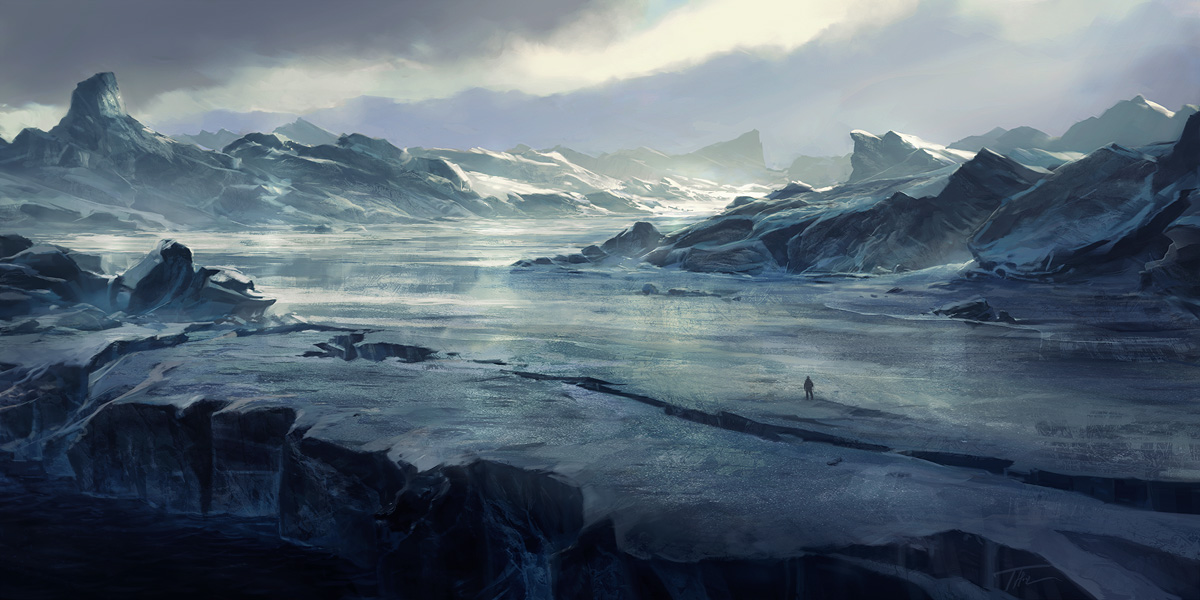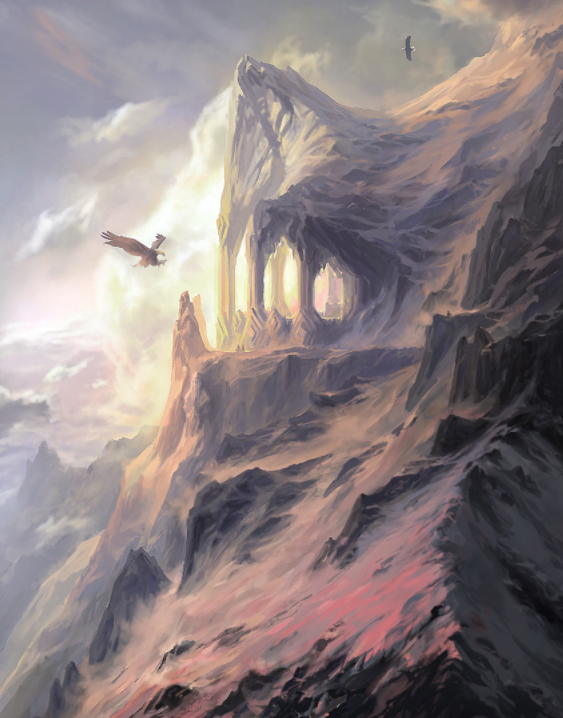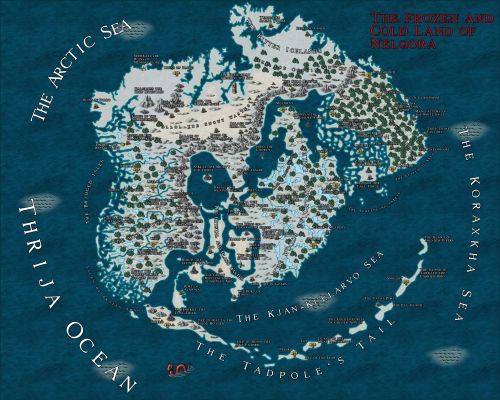The Mariner Empire of Nelqora
The Nelqorana were a proud and strong people that lived in the far, far north in a land surrounded by frozen seas. Their homeland of Nelqora was one of ice, snow, and frost; but they became strong in those sterile environs and came southward like a terrible storm; they forged for themselves a global empire. They enthralled the people of Tizüb, Aran, and Erub. They raised cities large and magnificent. They sundered continents with the sword. The Men of Nelqora were above all men of the sea, and they went to all corners of the earth. Their fair sails emblazoned with the golden swan were the heralds of a race come to save a world long wearied by the ancient Eastern Elves and the remains of the Black King's kingdom.
History
As with all Men, those who would become the Men of Nelqora first arose in the fields of Baantar. These First Men wandered northwards into Altaic country—a land of harsh tundras and chilly ice floats. The Altaic were, at the time, relatively untouched by Gendûet's influence, so they were glad to teach these Men their ways of survival and speech. But these Men were not yet come to full stature while in the Altaic countries, and were still organized into tribes collectively called the Corodwalt.
Eventually, the Corodwalt tribes were betrayed by the Altaic and soon engaged in a bitter war. The Altaic, and their eastern allies, initially little worried over the Corodwalt. The Altaic were wiser, and were supported by Abayin. The Corodwalt were weak-willed, short-lived, and rash. But the Yeqitari soon learned to fear the strong arm of Men. The Corodwalt fell into frenzied rages, and slew dozens of Altaic before falling themselves. The Corodwalt destroyed their own farmlands so that the enemy couldn't subsist from them. They slaughtered Altaic regiments with ambushes and traps, and chased them down like dogs. But despite their bravery, they were never a united people and bickered often; more pressingly, they could not outmaneuver Abayin, and soon the tide turned. It was at this time that Calmacil the Half-elven arrived in the cold north with Men of the House of Bel, and with silver tongue and iron sword he established a federation between the tribes. Though Calmacil died in the Seventh War of Hate against the dragon Young Purple, his great-grandson Fareacil became King of the Corodwalt. By now the tribal Men of the Corodwalt had grown in strength, stature, and skill; they now could rightfully take the name Nelqorana: the High Men of the North.
A Divine Gift
At the end of the Wars of Hate the gods granted the Men of Nelqora a boon for their part in the war. The Nelqorana would be granted an island. They need only to tell where, and the gods would shape the earth. This isle would be beautiful and rich in resources. The dirt would be black, and a casual throw of seeds of any sort would reap a bountiful harvest. The weather would be fair and even. The cliffs would be tall and provide a fair view. The woods would be thick and dark and easily purposed for shipbuilding. So long the Men of Nelqora took care of this isle, they would live in abundance.
But the Men of Nelqora loved the lakes and snow-covered pines and firs and the desolate plains of the north. The Northerness was in their blood. Furthermore, because the Altaic Elves had shown them kindness before, they dared not to encroach on the Elves' old territory. So they asked, almost sheepishly, that they could rather have a land far to the north, away from the matters of the world.
The gods granted their wish but, because they chose out of kindness for friends long turned enemy, the gods gave them a bounty greater than the original offer.
The woods were not only thick and dark and easily purposed for shipbuilding, but also grew quickly. A forest cut down could regrow in a year. The cliffs were tall and made of salt. The weather followed the needs and desires of the people who farmed the land. It rained when it needed to, and no snow ever fell on the the Vale of Abo, which was called the Great Gift of the Gods. Though the island was mostly snow and tundra, the Vale of Abo was ever fertile and warm. Underneath the great central volcano Asklja sprung the hot river Nyslott, which warmed the Vale of Abo. The hotness of the river didn't kill the crops but instead nourished the land to be rich and green. The Nelqorana were granted long and healthy lives. But the greatest gift of the gods were the Great Eagles, whom the Men of Nelqora tamed and rode.
So a cold and white isle (with a strip of green) arose in the far north. It was shaped like a tadpole. Minor islands in the south trailed behind like a rimy tail. Everything the gods said would be, was, and the Men of Nelqora were glad. The gods reascended to Heaven with Gendûet in chains, and the world began its long recovery.
Grinding ice soon grew up around the island, and ships could only reach Nelqora by means of the southern pass Koraxka.
Rise and Fall of an Empire
The rest of Nelqora's history and her people is one of growth, colonization, decadence, and then destruction. The Men of Nelqora spread across the world on their long, white ships and brought learning and understanding to primitive peoples. With iron from the Mountain Halgrons they created wondrous tools to build and create with. They also made weapons to combat malevolent forces. As said before, their white sails emblazoned with the golden swan was a sign of joy.
But after many years this benevolent industry soon turned to greedy conquest, and the Nelqorana stretched their empire across the northern hemisphere. The heart of their empire, the island of Nelqora, grew tall and fair and strong. Raised across the tundras and snowlands were spires of ice. Palaces were chiseled out from the mountainsides. The eyries of their Great Eagles grew so tall that they could be seen from the northernmost tip of the Altaic Country. The ships of the Nelqorana became many sailed and large and dominated the seas with their fires that could freeze water. Even the misted lands of Moinen were penetrated by the Nelqorana. Nothing was unexplored or unreached by them.
This glorious but cruel age lasted many hundreds of years. The beginning of the end was when the last Emperor of Nelqora Kjan-Kullarvo at last invited the Arch-devil Abayin, lieutenant of Gendûet, to his court. The Nelqorana had long been dabbling in black magic and the cults of the pagans, but it was when Abayin began to advise the Emperor that the Nelqorana entered their most powerful and prosperous age yet. The Devil whispered words of wisdom to the Emperor, but they were only meant to deceive, for the Devil envied the Nelqorana's great wealth and power, and he despised Men for felling his master, and he wished to destroy all that they had wrought.
The Folvkin Palace and Nelqora's Destruction
This final age was defined by the Folvkin Palace; the Palace in the Sky; the Palace that Reached the Heavens. It was a monstrous building with its foundations set on the dead volcano of Makai. The palace was to be built higher and higher, like a spike. Abayin murmured that, when the Folvkin Palace at last reached the sky, the Nelqorana would be able to pierce the Heavens and take it from the gods. Emperor Kjan-Kullarvo, who was forty when the project began, focused his empire's efforts on the palace. He would grab Heaven as if it were an object to be taken.
After many years the Nelqorana were about to finish their palace. But before they were to set the final stone on the final spire of their palace, the gods beseeched Vahan. For too long had the Men of Nelqora ignored their warnings, and for too long had they been suffered.
The sleeping magma underneath Makai awoke. The little volcano erupted and melted away the stone keeps and fine towers of ice and crystal. The Folvkin Palace came crashing down and fell upon the island. All the ramparts and all the magical safety measures failed as the rumbling of the volcano set off a dozen other mountains long thought dormant. Fire burst from the ground and sundered the earth. Nelqora tore in two, and the falling palace crushed the Vale of Abo, and covered the green land under ice and crystal.
The Divorce of Heaven and Earth
Then Vahan took Sky and Heaven and divided them. The veil was torn away and Heaven was removed from the Earth. No longer could one ascend to the gods as Detheril did with his white ship. For now the sky only ever grew taller, forever and ever, and the confines of the earth were open to the starry expanse.
A sign was placed upon the world. Once a night, on the day that Nelqora was destroyed, at the very top of the world a pole of light would descend from the Heavens. If one could climb its full height in a day, then he should reach the gods. But it is impossible, as the pole stretches as far as the sky does: forever and ever, into the midst of the innumerable stars.
Resolution of the Destruction
Now, the eruptions, the earthquakes, and the falling palace—splintering and sending down shards like missiles—destroyed all there was on the island of Nelqora. The hot river Nyslott was chilled and the fiery bowels of Asklja were emptied. The Vale of Abo was no more. The iron of Halgrons had been long stripped away. The wondrous towers and spires of the tundra were shattered and broken by the disasters and the falling palace. The fields of darkly wooded trees had been flattened and rendered impotent as shards of crystal poisoned the soil. Without their tools, the Nelqorana couldn't mine the salt of their cliffs.
There was nothing left of Nelqora but many ruins and a handful of people. The Emperor Kjan-Kullarvo had been at the top of the Folvkin Palace to oversee the placement of the final stone. He was dead—crushed like the seat of his empire. The Devil Abayin hadn't escaped a grisly fate, either. He had begun to believe his cunning lies and, after seeing the might of Nelqora, he fancied that the Heavenly Hosts might be challenged by the High Men of the North. He, too, was destroyed with his Emperor at the top of the Folvkin Palace. They say that the Devil Lord can never take a fair form ever again. He is forever pierced by a million shards of ice and crystal.
When many sought to escape their desolate island, they found the pass of Koraxkha had closed with ice. They were trapped and no one could help them. Their eagle eyries had been destroyed, and though the eagles escaped the immediate destruction, they had nothing to eat, for Nelqora was now naught but ice and snow. The eagles traveled south over the sea to find food. All of them died during the journey but for one, the greatest of their breed, Flaxanavi. But he was weak and starved at the end of his travels, and with his dying breaths, he told of the tragedy of Nelqora to the villagers who found him crashed against a tree.
The empire quickly crumbled without their heartland. All that is left of Nelqora are ruins on the southern continents.
But they say that the Men of Nelqora are a hardy race, and it is possible some of them still survive to this day. It is impossible to know, as the ice is impassable, and in the vast sea even Magic cannot locate where the island is.
Some say Nelqora was a myth, but their ruins say otherwise. Their legacy remains.
The full tragedy of the island of Nelqora is recorded in the Vahka Vanha.
Empire of the Tall Men
Empire of the Nelqorana
Country of Mariners
Country of Chalk and Salt
Enlightened Kingdom
Impious Empire
Hail to the Nelqorana, men of the Sea! It is good to see the white and golden sails. Their lords stand on the bow, and the spray is good to them. Do you hear the white gulls scream above the beaches? To the sea, the heart cries, to the sea! the white gulls are crying . . . The lords of the north come to the southern shores, and they are magnanimous in deed and word.



Comments